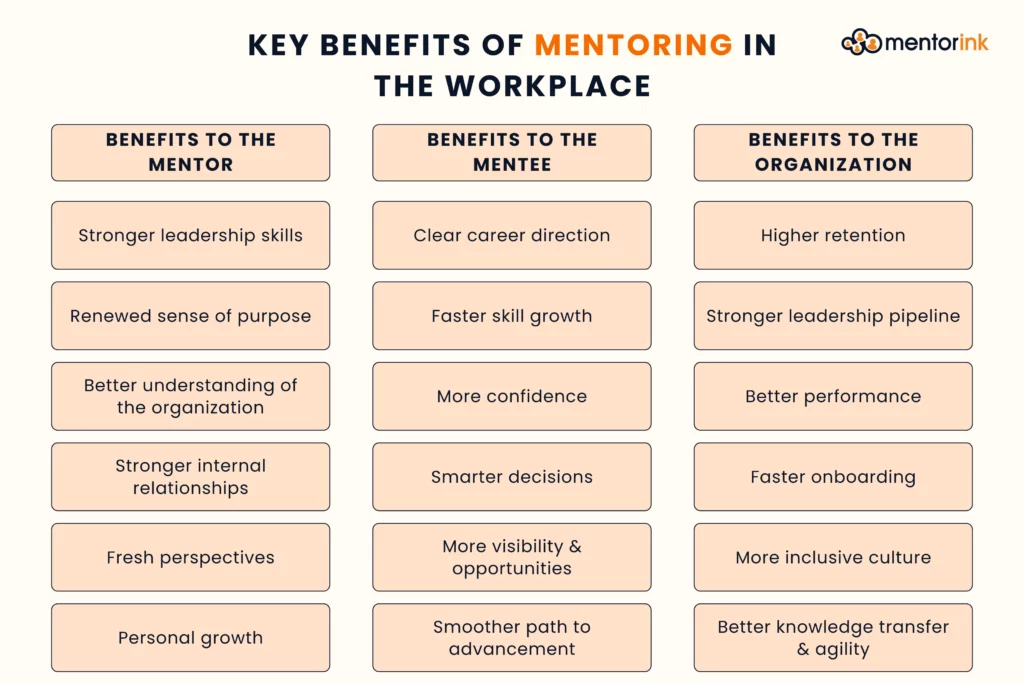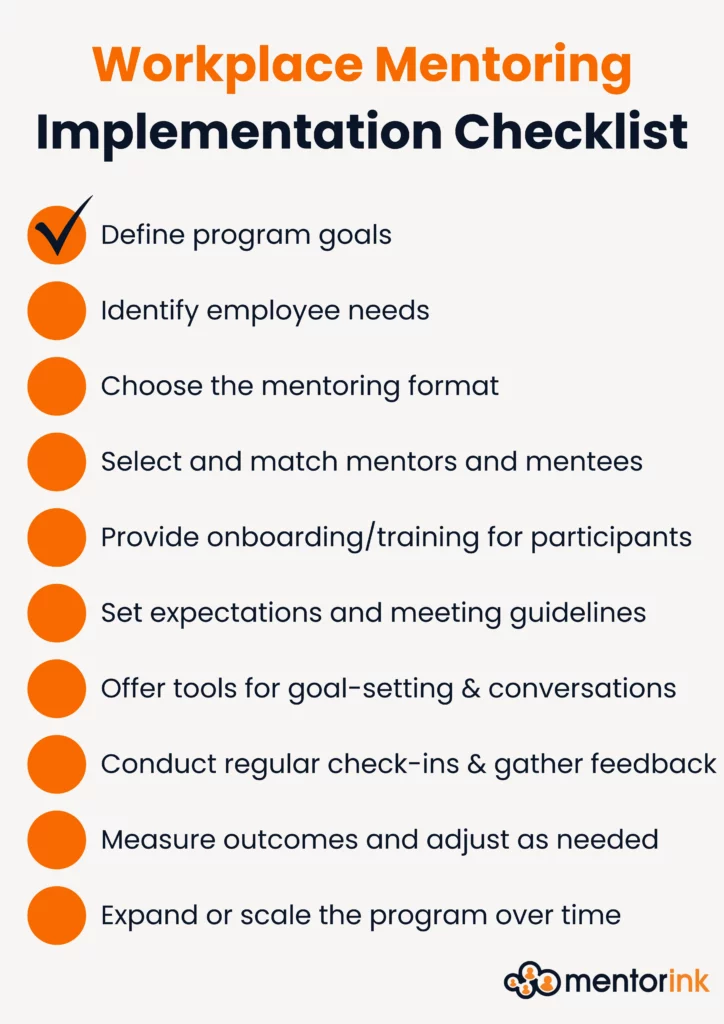
Mentoring is everywhere in the modern workplace. Or at least, it should be.
Because if we are honest, most employees are not just looking for a paycheck anymore. They want direction, clarity, connection, and someone who can look at them and say, “You’ve got this. Here is how.” And they are very clear about it. According to a 2024 Deloitte study, 86% of Gen Z and 89% of Millennials say having a sense of purpose is essential for their job satisfaction and well-being. When purpose matters this much, mentoring stops being optional and becomes a real workplace necessity.
That is where workplace mentoring steps in. Not as a corporate buzzword, not as a once-a-year HR ritual, and definitely not as a “coffee chat with extra steps.” It is a powerful, human-centered practice that shapes how people grow, learn, and feel at work.
A well-designed mentoring culture turns everyday conversations into learning moments, turns uncertainty into confidence, and turns employees into a community. And the best part? It works.
This guide explores what mentoring really looks like inside the workplace. Why it matters. Where it is missing. How it transforms people and teams. And how organizations can build programs that actually work, the kind of programs employees do not forget about after Week 1.
If you are ready, let’s dive into the world of workplace mentoring and see what really makes it work.
What Is Mentorship in the Workplace?
Mentorship in the workplace is a structured but deeply human relationship where one employee helps another grow. At its core, workplace mentoring is built on guidance, shared experience, and honest conversations that help people understand where they’re going, and how to get there.
It’s not limited to “senior teaches junior.” Strong mentoring cultures go beyond hierarchy. Mentoring can happen between peers, across departments, across generations, or even across continents in hybrid teams. The structure may vary, but the purpose remains the same: clarity, development, and connection.
A meaningful mentoring relationship provides:
- Trust and psychological safety: A place where employees can ask questions they wouldn’t ask in team meetings.
- Guidance based on real experience: Not theory, but lived stories, practical steps, and real lessons learned.
- Support and accountability: Someone who helps you stay focused, grounded, and intentional.
- Space to explore strengths and challenges: Employees reflect, grow, and uncover a clearer professional identity.
In many organizations, mentoring becomes the environment where real learning happens, the kind that no onboarding manual, no training video, and no job description can truly replace. When mentoring becomes part of everyday culture, employees feel supported rather than isolated, engaged rather than confused, and motivated rather than stuck.
Workplace mentoring is ultimately a deliberate effort to help people succeed through meaningful human connection. And when done consistently, it reshapes how people learn, collaborate, and stay engaged at work.
Areas of Mentorship in the Workplace
Mentorship isn’t one thing. It doesn’t live in a single meeting, a single format, or a single relationship. Workplace mentoring shows up in all the places where employees need clarity, confidence, connection, or simply someone who “gets it.”
Think of mentorship as a support system that adapts to the moments where people feel stuck, curious, overwhelmed, ambitious, or a little bit lost. Here are the major areas where mentoring naturally becomes a game-changer inside an organization:
- Career Growth and Navigation: Mentors help employees make sense of their career path, not by mapping it out for them, but by helping them see what’s possible. They explore strengths, clarify direction, and break “I don’t know where to start” moments into clear, doable steps.
- Skill-Building and Upskilling: From communication habits to leadership behaviors to technical know-how, mentoring creates a safe space to learn, practice, stumble a little, and try again. It’s development with real context, not just another training module employees forget by next Tuesday.
- Onboarding and Culture Integration: New hires settle in much faster when someone actually shows them how the company works beyond the handbook. A mentor helps them understand expectations, navigate unwritten rules, and feel like they belong, not just like they joined a new Slack workspace.
- Leadership Development: Great leaders aren’t produced by accident. Mentorship gives emerging leaders a place to test decisions, understand team dynamics, handle conflict, and build emotional intelligence. It’s where “I think I can do this” becomes “I know I can.”.
- DEI, Belonging, and Psychological Safety: For employees who might not naturally have access to networks or visibility, mentoring creates fairness and support. It gives people someone who advocates for them, listens to them, and helps them navigate challenges with confidence.
- Knowledge Transfer Across Generations: When experienced employees leave, their knowledge often leaves with them. Mentoring captures that wisdom and passes it forward. And with reverse mentoring, younger employees bring fresh skills, digital fluency, and new perspectives back up the chain.
Mentorship touches almost every stage of an employee’s journey. Wherever people need clarity, confidence, or connection, mentoring becomes a powerful tool that helps them move forward. And when these touchpoints are missing, lack of mentorship in the workplace can create gaps in clarity, confidence, and continuity, leaving employees to figure things out alone. Even a small amount of guided support can make the difference between feeling lost and feeling supported.
A mentor is someone who allows you to see the hope inside yourself.
Oprah Winfrey
Benefits of Mentoring in the Workplace
Mentoring is far more than a nice workplace extra. It’s one of the most dependable ways to help employees grow with confidence, build stronger relationships, and shape a healthier work culture. When people have someone they can learn from, talk to, and genuinely trust, their performance rises, collaboration feels more natural, and the overall atmosphere of the workplace becomes more positive and supportive. The impact starts at the individual level and quickly expands across teams and the entire organization.
These benefits paint a pretty convincing picture. But the real question is why mentoring works this well in the first place. Let’s take a closer look at what makes workplace mentoring such a powerful engine for growth.
Why is Mentoring Important in the Workplace
The importance of mentorship in the workplace goes far beyond pairing two people for a few structured conversations. Mentoring is one of the rare development tools that supports employees as whole human beings. It strengthens confidence, brings clarity, and provides the kind of genuine human connection that most workplace systems simply cannot create on their own.
Mentoring matters because it fills the gaps that traditional learning methods leave behind. Job descriptions, performance reviews, and training sessions all serve a purpose, but none of them replace having someone who listens, understands your goals, and helps you navigate real challenges. A well-supported mentoring relationship offers guidance, accountability, and emotional encouragement in ways that directly influence how motivated and engaged people feel in their everyday work.
Most importantly, mentoring creates a workplace where people do not feel like they are facing everything on their own. It fosters belonging, supports continuous learning, and helps employees see a future for themselves within the organization. When individuals feel supported, they stay longer, contribute more, and grow faster, which is exactly why mentoring remains one of the most impactful investments any company can make.
And once mentoring becomes part of how people learn and connect, the experience doesn’t just shape careers… it also shapes the people who step up to guide others.

Mentoring in the Workplace: Benefits to the Mentor
Mentoring is often framed as something that primarily benefits the mentee, but mentors actually gain just as much. Supporting someone else’s growth forces you to slow down, reflect, and look at your own experiences with fresh eyes. It reminds you why you do what you do, sharpens your leadership instincts, and keeps you connected to what people in the organization are really navigating day to day. In short, mentoring makes mentors better, too.
Here’s what mentors gain along the way:
- Enhanced leadership skills: Real conversations build real leadership. Mentors naturally improve how they communicate, listen, coach, and problem-solve.
- A renewed sense of purpose: Helping someone grow feels good. It creates meaning, boosts motivation, and deepens a mentor’s connection to their work.
- Broader organizational insight: Mentors gain a clearer picture of emerging talent, shifting expectations, and cultural patterns across different teams.
- Stronger internal relationships: Mentoring expands networks and builds trust across levels, making collaboration easier and more natural.
- Fresh perspectives: Mentors learn from mentees, too. New ideas, generational perspectives, and updated ways of working keep them relevant and curious.
- Personal and professional growth: Reflecting on lessons learned helps mentors refine their leadership identity and stay open to continuous learning.
Mentors grow in meaningful ways they often don’t anticipate. The experience expands their perspective and strengthens their leadership in ways that stay with them long after the conversations end.
Now, to understand the full impact of strong mentoring relationships, it’s time to look at what mentees gain from the experience.
Mentoring in the Workplace: Benefits to the Mentee
For mentees, mentoring is often the first time someone at work truly says, “Tell me where you want to go, and let’s figure it out together.” It offers the kind of support that no onboarding checklist, training video, or quarterly review can replace. A mentor becomes a sounding board, a guide, and sometimes the person who helps you see potential you didn’t even realize you had.
Here’s what mentees gain when mentoring is done well:
- Clearer career direction: Instead of guessing their next move, mentees learn what they’re good at, what they want, and what’s actually possible.
- Faster skill development: Real conversations and real examples beat generic training every time. Mentees learn faster because they learn in context.
- A confidence boost that actually sticks: When someone believes in you, gives honest feedback, and pushes you when needed, self-belief grows naturally.
- Smarter decision-making: Having someone experienced to think things through with makes choices feel less scary and a lot more strategic.
- Stronger workplace relationships: Mentoring helps mentees feel grounded and supported, which makes the whole workplace feel less intimidating.
- More visibility and opportunity: Mentors often open doors, offer introductions, or simply say, “You should be in this meeting.” Those moments matter.
- A smoother (and faster) path to growth: Mentees understand what advancement really looks like and how to prepare for it without feeling lost or overwhelmed.
Good mentoring doesn’t only improve skills. It changes how mentees show up every day, with more confidence, clarity, and excitement for what comes next. Now that we’ve explored how mentoring supports individual growth, it’s time to zoom out and look at what happens when these relationships start shaping the organization as a whole.

Mentoring in the Workplace: Benefits to the Organization
When mentoring becomes part of an organization’s culture, something meaningful changes. The impact is not limited to mentors or mentees. The entire workplace starts to feel more connected, more confident, and more capable. And the impact shows up clearly in the numbers: workplaces with mentoring programs often see retention rates around 72% for mentees and 69% for mentors, compared to roughly 49% for employees not involved. People stay when they feel supported, and mentoring delivers that support.
Here are the key benefits organizations gain when mentoring is built into the way people work:
- Higher employee retention: Employees who feel supported and understand their growth path are far less likely to leave. This reduces turnover costs and keeps teams stable.
- A stronger leadership pipeline: Mentoring helps organizations identify potential leaders early and prepare them with practical, experience-based guidance.
- Improved performance and productivity: Teams function more smoothly when employees feel confident, connected, and aligned with organizational goals.
- Better onboarding outcomes: New hires adapt more quickly when they have someone who can show them how things actually work, both culturally and operationally.
- A more inclusive and equitable culture: Mentoring increases access to support and visibility for employees who might otherwise be overlooked, which strengthens DEI efforts in meaningful ways.
- Stronger knowledge transfer: Critical expertise stays within the company instead of being lost during turnover or restructuring.
- Higher engagement and morale: People who feel valued and supported show up with more energy, curiosity, and commitment.
Mentoring shapes the way a workplace grows and works together. It strengthens culture, deepens collaboration, and helps teams move with clearer purpose and shared goals.
Now that the foundation is in place, the next step is to look at how mentoring actually appears in day-to-day work.
Types of Workplace Mentoring
Modern organizations do not rely on a single mentoring style. They mix and match approaches to support learning, leadership growth, cross-functional collaboration, and culture-building. Each type serves a different purpose. Some formats help new hires settle in quickly, some strengthen leadership pipelines, and others create space for peer support or generational knowledge-sharing.
Choosing the right types of workplace mentoring allows companies to design a program that truly fits their people and culture. Below are the most common formats used today, each offering unique strengths depending on the organization’s goals.
- One-to-one mentoring: The classic model. One mentor works closely with one mentee through regular conversations that support growth, confidence, clarity, and skill development.
- Peer mentoring: Employees at similar experience levels support one another, share challenges, and learn together. This format strengthens teamwork and reduces the sense of isolation.
- Reverse mentoring: A junior employee mentors a senior leader, often on emerging technologies, new ways of working, or cultural perspectives. It builds empathy and closes generational gaps.
- Group mentoring: One mentor guides several mentees at once, creating a collaborative learning space where people learn from the mentor and from one another.
- Mentoring circles: Small groups come together around a shared topic such as leadership, confidence, or DEI. Everyone contributes, learns, and supports each other.
- Flash mentoring: Short, focused conversations designed for quick insight rather than long-term relationships. Ideal for fast-paced teams or moment-specific learning needs.
- Functional or expertise-based mentoring: Mentees learn directly from experts in a specific domain, which helps build targeted technical or role-specific skills.
Some mentoring formats focus on deep, one-to-one reflection. Others bring people together in groups or encourage cross-level learning. Each contributes to something valuable. Together, they help build relationships, strengthen communication, and shape meaningful workplace mentoring activities that support different needs across the organization.
Workplace Mentoring Program
A workplace mentoring program is a structured way to bring employees together so they can learn from one another through intentional and meaningful conversations. Instead of hoping learning “just happens,” a program creates a supportive space where guidance, reflection, and honest dialogue flow naturally.
Inside a Structured Mentoring Program
In a strong mentoring program, employees are paired with someone who can help them set goals, navigate challenges, and build new skills. This creates a level of clarity and connection that traditional training rarely provides. Mentees gain someone they can trust and learn from, and mentors find satisfaction in supporting someone’s development.
A well-designed program sends a clear message: employee development is not optional or secondary, it is part of the culture. When people feel supported in this way, the entire organization becomes stronger.
A workplace mentoring program brings structure, consistency, and real intention to mentoring. It removes guesswork and offers a framework that makes mentoring accessible, sustainable, and impactful for everyone involved.
How to Establish a Workplace Mentoring Program
Building a mentoring program does not have to feel overwhelming. It starts with defining the purpose of the program and identifying the employees it will serve. Once that foundation is in place, the organization can focus on thoughtful mentor–mentee matching and ensuring that pairs have the time and space to meet consistently.
Successful programs also offer light guidance on expectations, meeting frequency, and useful conversation topics. This supports participants without limiting the natural flow of the relationship. As the program evolves, regular check-ins and small adjustments help it stay relevant, engaging, and aligned with organizational needs.
Use cases
- Leadership development: Helping emerging leaders build confidence, emotional intelligence, and stronger decision-making skills.
- Onboarding and integration: Supporting new hires as they learn company culture, expectations, and real workflows so they adapt more quickly.
- DEI and belonging: Creating equitable access to opportunities, visibility, and support for employees who may not naturally receive it.
These elements transform mentoring from a simple relationship into a powerful driver of organizational growth and culture-building.

Workplace Mentoring Activities
Mentoring becomes meaningful through the activities that shape each conversation, build trust, and open the door to real learning. These moments move the relationship forward in a way that feels natural and connected to everyday work life. When done well, they turn simple discussions into genuine growth experiences.
- Goal alignment sessions: Mentors and mentees start by exploring career goals, strengths, and priorities. These early conversations create shared direction and set the tone for a purposeful relationship.
- Skill development moments: Focused discussions on communication, leadership, or technical skills help mentees grow in real, practical ways. Mentors share the methods and experiences that worked for them, making learning more relatable.
- Career reflection conversations: These deeper talks help mentees look at past decisions, upcoming opportunities, and long-term aspirations. The mentor’s perspective brings clarity to the bigger picture.
- Shadowing and real-world exposure: Watching a mentor in meetings, presentations, or daily routines gives mentees an insider view of how things actually work in the organization.
- Supportive feedback exchanges: Feedback turns into open dialogue rather than a formal review. Both sides share insights that improve communication, self-awareness, and confidence.
- Problem-solving dialogues: Mentees bring real challenges to the table. Mentors help break those challenges down, explore options, and create clear next steps.
- Regular check-ins: Short, consistent meetings help maintain momentum and keep the relationship adaptable as needs evolve.
- Shared learning activities: Discussing an article, project, or trend sparks new ideas and keeps conversations fresh, dynamic, and engaging.
These activities make workplace mentoring feel human and genuinely valuable. When woven into regular conversations, they build a relationship where both mentors and mentees gain clarity, confidence, and a stronger sense of connection.
Examples of Mentoring in the Workplace
Mentoring takes many forms in daily work life, and the most meaningful examples often come from simple moments of guidance, shared experience, and honest conversation. Below are realistic workplace scenarios that illustrate how mentoring supports growth, strengthens relationships, and drives better outcomes across the organization.
1. A New Hire Paired with an Experienced Team Member
A new employee joins the company and is matched with a mentor during onboarding. They meet weekly to discuss expectations, understand the team’s workflow, and navigate early challenges. The mentor’s guidance helps the new hire feel confident, connected, and productive much faster.
2. Cross-Department Mentoring for Broader Skills
A marketing specialist interested in product strategy works with a mentor from the product team. Through discussions and shadowing sessions, the mentee gains visibility into product decisions, collaborates on small assignments, and eventually takes on cross-functional projects.
3. Leadership Development Through Mentoring
An individual contributor preparing for a leadership role partners with a senior manager. Their conversations focus on decision-making, team communication, and navigating complex situations. Over time, the mentee develops the confidence and interpersonal skills needed to lead a team.
4. Reverse Mentoring to Strengthen Digital Skills
A junior employee mentors a senior leader on emerging technologies, new digital tools, or generational workplace expectations. This creates a two-way learning experience where both gain perspective and strengthen collaboration.
5. Mentoring Circles for Peer Support
A group of employees join a mentoring circle focused on topics such as confidence, communication, or DEI. Participants share stories, exchange insights, and support each other’s growth in a collaborative, community-driven space.
6. Project-Based Mentoring
A mentee preparing for a major presentation works with a mentor who has delivered similar projects in the past. Together, they refine the message, anticipate questions, and rehearse delivery until the mentee feels fully prepared.
Today, the lines between mentoring and networking are blurring. Welcome to the world of mentworking.
Julie Winkle Giulioni
Examples of Coaching and Mentoring in the Workplace
Coaching and mentoring both help employees grow, but they show up differently in real workplace situations. Coaching is usually focused on a specific skill or performance goal, while mentoring supports broader, long-term development. If you want a deeper comparison, you can explore our “Coaching vs. Mentoring” breakdown to see how the two approaches differ in practice. The examples below show how each approach works on its own and how they can complement each other when used together.
Coaching Scenario: Improving a Specific Skill
An employee preparing for an important client presentation works with a coach to strengthen public speaking skills. The coach focuses on technique, delivery, pacing, and confidence. They run practice rounds, give targeted feedback, and help the employee improve quickly for a very specific and time-bound goal.
Mentoring Scenario: Navigating Long-Term Career Growth
A mid-level employee pairs with a senior colleague to gain clarity on their career direction and future opportunities. Their conversations go far beyond a single skill. They discuss long-term goals, workplace challenges, leadership readiness, and strategies for navigating the organization. The mentor shares insights based on lived experience and helps the mentee make thoughtful choices about their career path.
Key Differences in Action
The coaching example focuses on immediate improvement and clear performance outcomes. The mentoring example focuses on long-term growth, confidence, and clarity. Coaching is typically structured and skill-based. Mentoring is more relational, experience-driven, and ongoing.
How Coaching and Mentoring Work Together
Many organizations use both approaches to create a complete development experience. For example, an employee might work with a mentor to understand their long-term career path while also working with a coach to strengthen a specific skill needed for an upcoming project. Coaching builds capability. Mentoring builds direction. Together, they help employees grow in a way that is both focused and meaningful.
These examples show that coaching and mentoring offer different kinds of support, yet they work even better when combined. With that foundation in mind, the next step is exploring how organizations can implement mentoring in a structured, sustainable way.
Implementing Mentoring in the Workplace
Implementing mentoring in the workplace takes more than pairing two people and wishing them luck. For mentoring to create real impact, organizations need clarity, intention, and an environment where meaningful relationships can grow naturally.
Below are the essential steps for building a mentoring experience that actually works.
Define goals
Every effective mentoring initiative starts with a clear purpose. Whether the goal is developing future leaders, improving onboarding, supporting DEI, or encouraging cross-functional learning, defining the “why” keeps the program focused and meaningful.
Map employee needs
Understanding what employees truly need helps shape the structure of the program. Surveys, conversations, and performance insights reveal who needs mentoring, which skills are in demand, and which mentoring styles fit best.
Mentor–mentee matching
Matching is one of the most important steps. Pairing mentors and mentees based on goals, experience, interests, or working styles increases compatibility and gives the relationship a stronger start.

Provide training
Mentors and mentees benefit from simple preparation. Short trainings, conversation guides, and resource toolkits help everyone feel confident, supported, and ready to build a productive partnership.
Communicate expectations
Clarity makes mentoring sustainable. Outlining meeting frequency, shared responsibilities, program length, and communication norms helps both sides stay aligned and consistent.
Measure success
Feedback brings the program to life. Check-ins, short surveys, and reflection moments help organizations understand what is working well and what may need adjustment.
Scale the program
Once a mentoring program gains momentum, organizations can expand it by adding formats such as peer mentoring, mentoring circles, or reverse mentoring. Successful examples and positive outcomes set the foundation for long-term cultural adoption.
When mentoring is implemented with care and intention, it becomes more than a development tool. It shapes culture, strengthens relationships, and creates a workplace where people feel supported, valued, and empowered to grow.
How Mentoring Software Can Help
Mentorink is one of the mentoring software leaders that makes it easier for organizations to build mentoring programs that are structured, scalable, and truly impactful. Instead of managing everything manually, HR and L&D teams can rely on a platform that guides the entire process from start to finish.
- Smart matching tools that pair people based on goals, skills, and interests.
- Structured session guidance that helps mentors and mentees have meaningful, productive conversations.
- Automated reminders and nudges that keep relationships active without manual follow-up.
- Easy scheduling and communication directly within the platform.
- Real-time dashboards that show participation, engagement, and progress.
- Feedback loops and check-ins that help organizations understand what’s working.
- Support for multiple mentoring formats such as peer mentoring, leadership development, and reverse mentoring.
- Seamless scalability as the program grows across teams and departments.
- A user-friendly experience that makes mentoring accessible for everyone, not just a small group.
With Mentorink, mentoring becomes more than an initiative. It becomes a sustainable, data-informed, human-centered experience that strengthens culture, supports development, and helps organizations grow with intention.

Whether you are taking your first steps or refining an established program, Mentorink is here to guide you every step of the way. Let’s shape your mentoring success together.
Key Takeaway
Mentoring delivers its strongest impact when it is treated as an ongoing experience, not a one-time initiative. When organizations define clear goals, listen to employee needs, and build a structure that supports authentic, human conversations, mentoring becomes a natural part of how people learn and succeed.
It strengthens relationships, accelerates development, and helps employees see a future for themselves inside the company. Over time, these connections create a workplace where people feel valued, leaders rise naturally, and teams operate with deeper trust and confidence. In other words, mentoring becomes part of how the organization grows, not just a program, but a long-term cultural advantage.



